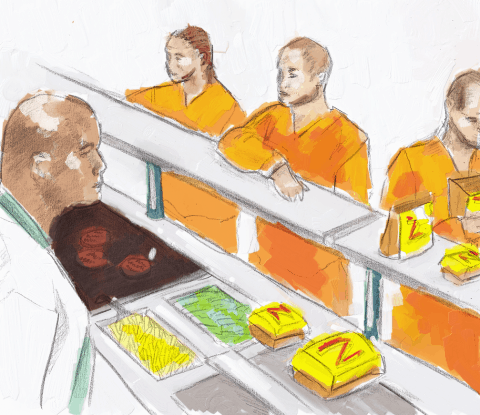 Privatization is not always the answer when it comes to government-based matters in the province of Saskatchewan. Yes, I’m talking to you Brad Wall and every person who supports the Saskatchewan Party.
Privatization is not always the answer when it comes to government-based matters in the province of Saskatchewan. Yes, I’m talking to you Brad Wall and every person who supports the Saskatchewan Party.
In a move to become more efficient, the Government of Saskatchewan is looking at outsourcing meals at correctional facilities — especially those near a large enough centre so that meals can be provided with ease. For the most part this proposal includes facilities in and around Saskatoon, Prince Albert and Regina.
In case you haven’t caught on as to why I’m referring to this move as a method of privatization, let me explain.
First off, privatization generally refers to transferring ownership of a business, enterprise, agency or public service (emphasis on the public service) from the public sector to the private. Hence, outsourcing meals at correctional facilities is a perfect example of privatization. We might as well just hire McDonald’s to feed the masses. Sheesh!
Now, I must stress that this only might happen, though Bob Bymoen of the Saskatchewan Government and General Employment Union has stated that “It’s a done deal,” according to an article in The Star Phoenix.
Bymoen notes that the government has a mandate to reduce government spending by 15 per cent, which is the primary cause for the evaluation of these services. But that’s not even the part of this whole bag of nonsense that really bothers me.
Through a private consultation process, food services were deemed as “not a core function” of correctional facilities. What utter malarky!
Clearly inmates are in prison for a reason, but they’ve got to eat to survive. How a government can agree that food services are not a core function is beyond me, but I welcome someone to explain that one to me.
Food, water and shelter are essential services for all individuals — be they in prison or not. Philosophically, the provincial government has gotten off track with this one. I’d like to see the Sask. Party survive without food for a few days to see if they’d change their minds about calling it “not a core service.”
The whole push for the government to consider this option of outsourcing meals is due to financial reasons. Let’s all bow down to the almighty dollar, since it rules the world.
Supposedly the money saved by outsourcing meals could be used and reinvested in other aspects of the correctional facilities or in the management of crime in Saskatchewan.
Of course we should be focusing more on crime prevention as opposed to criminalization, but taking money away from what I consider to be a core service is pitiful to say the least — especially when government jobs are lost.
If the change goes through — and it sounds like it will — 62 people would be affected: 24 full-time and 38 part-time workers.
But what are the benefits for the government in doing this? If the government is able to privatize food services at correctional facilities and, subsequently, lay-off 62 workers, they will obviously save a lot of money. They won’t only be saving money on general salaries for these workers, but also on all the benefits that go along with a government job.
Avoiding expenditures on pension and health plans for employees the government doesn’t really care about sure is a great way to save money. And really, 62 jobs lost really isn’t that bad. I’m sure those workers will find work in the private industry where worker benefits are few and far between and salaries are substantially lower.
In the 2012-13 fiscal year, it cost the government $3.7 million to feed inmates, so I wonder how much cash they will actually be spending and saving should these proposed changes go through?
My heart goes out to anyone who ever loses their job because of privatization of industry. And I think we’d all be wise to think critically when privatization occurs.
Sure there are financial benefits, but what are the costs at the human level? I know that money matters, especially to the government (as it should), but let’s not forget that people matter too.
—
Graphic: Rhea Lonsdale
Leave a Reply